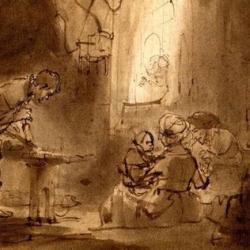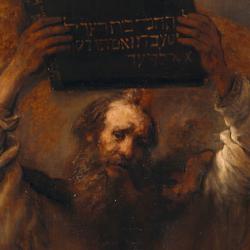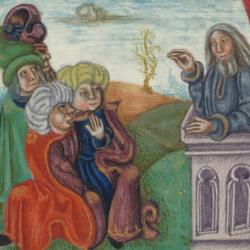Yahweh’s opening speech in Exodus 10 is arranged as a parallel structure:
A. Go; I have hardened Pharaoh’s heart
B. That I may perform signs
C. that you may tell to sons and sons of sons
A’. I made a mockery of Egypt
B’. I performed signs
C’. that you may know I am Yahweh
A few observations on the contents.
First, the verb translated as “harden” in verse 1 is kabad , which can mean “glorify.” Pharaoh lifts up, glorifies His heart against Yahweh; Yahweh judges him by giving him to his self-glory. Second, for the first time Yahweh hardens not only Pharaoh’s heart but the hearts of Pharaoh’s servants. The same pattern is at work: Pharaoh and his officials hardened their hearts after the plague of hail and thunder, and so Yahweh gives them over to their hardness. Egypt’s leaders as a unit are being hardened.
Third, the repetitions in the A and C sections create a musical feel to the verses. The word “heart” ( leb ) is doubled; Yahweh hardens Pharaoh’s heart and the heart of His servants. In verse 2, the word son ( ben ) is repeated three times: Yahweh acts so that Israel can tell stories of Yahweh’s acts to sons and sons of sons. The result is a rhyming phrase: binka uven-binka . Verse 6 continues the music: Locusts are going to come such as “neither your fathers nor the fathers of your fathers have seen” – avoteka wavot avoteka , another rhyme.
Fourth, Yahweh performs signs so that ( lema’an ) the Hebrews will have something to recount. The verb for “tell” is safar , which means “write” in many contexts. Yahweh is the great hero of an epic poem, and He does glorious deeds so bards throughout the ages will sing and write His praise.
Finally, the A’ section uses the very flexible verb ‘alal . The root of the verb means “drink deeply” or “quench thirst completely,” but the various uses deviate from that root meaning in all sorts of odd ways. ‘alal is the verb for “glean” (Leviticus 19:10; Deuteronomy 24:21), which can be used metaphorically for the preservation of a remnant (Jeremiah 6:9) or for pressing men into military service (Judges 20:45). Yet the word is also translated as “abuse” – the deadly abuse of the Levite’s concubine (Judges 19:25); Saul’s fears that the Philistines would abuse him (1 Samuel 31:4), which is echoed by Zedekiah (Jeremiah 38:19 – the last king of Judah echoes the first); the abuse of heart that Jeremiah feels when he looks at Jerusalem (Lamentations 3:51). Consistent with the meaning “abuse,” the word sometimes means vexing or toying with someone to cause pain.
In Exodus 10:2, several of these possible meanings are in play. Yahweh “satisfies Himself” by performing signs on Pharaoh. Yahweh abuses Pharaoh. Yahweh toys with Pharaoh. I cannot help but suspect that a whisper of hallal is linked with ‘alal : Pharaoh glorifies himself with self-praise, so Yahweh gives him a kind of inverted praise, not hallal but ‘alal .










